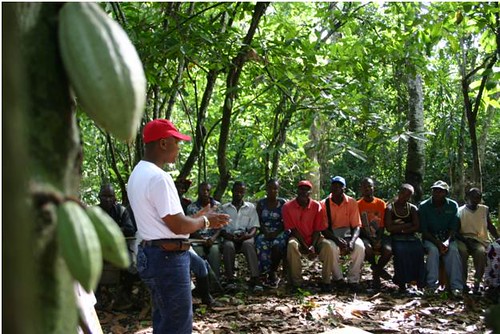
Nations like Liberia have much to gain, as high-level officials from the United States and 37 Sub-Saharan African countries gather in Lusaka, Zambia, for the June 9-10 African Growth and Opportunity Act (AGOA) Forum. Not only is Liberia eligible for AGOA trade preferences, allowing it to export a host of agricultural products to the United States duty-free, but it could receive more than $87 million in U.S. assistance in fiscal year 2011 to strengthen economic growth, which includes its agricultural sector. U.S. trade capacity building and technical assistance places Liberia in a better position than most to take advantage of AGOA trade preferences.
One program that has been used to strengthen Liberian agriculture is the USDA’s Food for Progress (FFPr) Program. FFPr targets developing countries and emerging democracies that are committed to introducing and expanding free enterprise in the agricultural sector. Liberia was an excellent candidate for the program having recently overcome 14 years of civil war. In late 2003, many Liberians returned to their communities from refugee camps only to find their farms overgrown and in disrepair from years of neglect.
Such was the case for farmers Smith Donso and Edwin Flomo. Initially, neither knew what to do, but later each learned about the Livelihood Improvement for Farming Enterprises (LIFE) program. LIFE is but one project under a global public-private partnership called the SUCCESS Alliance (Sustainable Cocoa Enterprise Solutions for Smallholders). LIFE focuses on teaching smallholder farmers modern cocoa-growing techniques to improve cultivation, production, and marketing. It also shows them how to diversify their crops so they will have a year-round income. Alliance partners include the USDA, the U.S. Agency for International Development (USAID), the World Cocoa Foundation, Mars, Inc., and local partners, with the private voluntary organization ACDI/VOCA as the implementing partner.
In fiscal year 2007, the USDA’s FFPr helped fund the LIFE program. Under FFPr, the USDA donated 9,000 metric tons of rice and 1,000 metric tons of flour valued at $6.7 million (including commodity, freight, and administrative costs) to ACDI/VOCA, which sold the commodities in the Liberian market and used the proceeds to train farmers on better farming practices, nursery development, and cocoa tree rehabilitation.
In 2010, the USDA’s Foreign Agricultural Service (FAS) evaluated the impact of FFPr on the LIFE program and found that FFPr had helped LIFE substantially raise cocoa farmers’ incomes. Farmers who took the LIFE training learned how to price and sell their cocoa more effectively, resulting in doubled earnings compared with those who did not take the training.
The benefits of this program extend beyond the farms. When Liberian farmers earn more income from the sale of their crops, they can feed their families and their villages, and trade with neighboring countries. The positive effect, Liberia’s economy will grow and the country will become more food secure. These conditions also will serve as a foundation for peace and further economic opportunity.
Thanks to these successes and the fact that agriculture accounts for 76.9 percent of Liberia’s $977 million (2010 est.) GDP (official exchange rate), the USDA again allocated FFPr funds estimated at $9.7 million to ACDI/VOCA in fiscal year 2010 to help support LIFE II.
